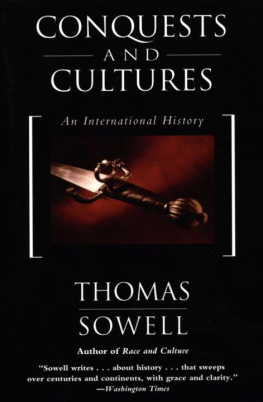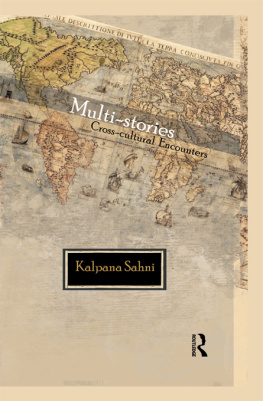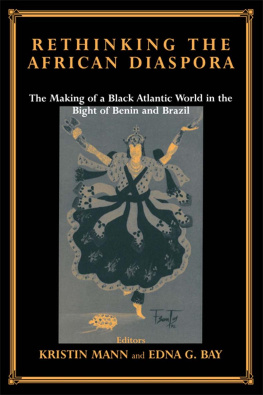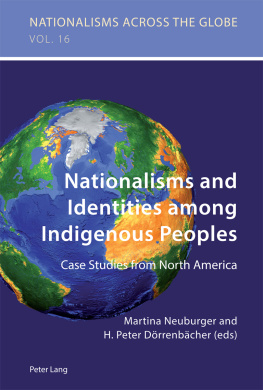OTHER BOOKS BY THOMAS SOWELL
The Vision of the Anointed
Migrations and Cultures
Race and Culture
A Conflict of Visions
Ethnic America
Knowledge and Decisions
THOMAS SOWELL



Now, if there be a fact to which all experience testifies, it is
that when a country holds another in subjection, the individuals of the ruling people ... think the people of the
country mere dirt under their feet ...
JOHN STUART MILL
ix
xiii
Chapter 1 3
Chapter 2 22
Chapter 3 99
Chapter 4 174
Chapter 5 249
Chapter 6 329
This book completes a trilogy that began with Race and Culture in 1994 and continued with Migrations and Cultures in 1996. All three were initially parts of a single huge manuscript that I began writing in 1982. Over the next decade, it grew to a size that militated against its becoming the one book that it was initially conceived to be. Parts of that original manuscript were removed over the years. Other material from the original manuscript was incorporated into a fourth book, an international study of affirmative action programs titled Preferential Policies: An International Perspective, published in 1991, before any of the books in this trilogy. The remaining material was not simply split into three parts but also continued to grow and develop as I read new scholarly studies that were being published during the long incubation period of this trilogy.
The underlying theme of all these books has been that racial, ethnic, and national groups have their own respective cultures, without which their economic and social histories cannot be understood. Modest as this claim may seem, it collides head-on with more widely accepted visions in which the fates of minority groups are determined by "society" around them, which society is therefore both causally and morally responsible for the misfortunes peculiar to the less fortunate of these groups-though apparently not responsible for the good fortune of the more successful minority groups. This trilogy also col lides head-on with prevailing doctrines about "celebrating" and preserving cultural differences. Cultures are not museum-pieces. They are the working machinery of everyday life. Unlike objects of aesthetic contemplation, working machinery is judged by how well it works, compared to the alternatives. The judgment that matters is not the judgment of observers and theorists, but the judgment implicit in millions of individual decisions to retain or abandon particular cultural practices, decisions made by those who personally benefit or who personally pay the price of inefficiency and obsolescence. That price is not always paid in money but may range from inconveniences to death.
On a broad international canvas, the role of culture reaches beyond particular racial and ethnic groups to encompass the differing economic and social fates of nations and of civilizations. That is particularly true of the present volume, which deals with the cultural consequences of conquests. Like migrations, conquests have changed the cultural landscape of the world. Indeed, the great mass migrations which have had such historic impact in the Western Hemisphere, Australia and New Zealand, and to a striking though lesser extent in Southeast Asia and Africa, have often been fostered by prior conquests. Those who resettled in these regions have not been simply members of the conquering nation or race, but have also included those who migrated from other lands with different cultures and races-the overseas Chinese in Southeast Asia, emigrants from India in East Africa and Lebanese immigrants in West Africa-settling under the protection of a colonial system of law and government in which they had greater confidence than in the laws and governments of the indigenous peoples. Among the indigenous peoples themselves, greater local or regional mobility became feasible under foreign hegemony than when different indigenous groups controlled different regions and jealously guarded them against outsiders. The negative aspects of conquest, ranging from routine oppressions to wanton slaughters and atrocities, are of course not to be overlooked either.
The history of conquests, like the history of international migrations, extends to a broader canvas many racial, ethnic, and cultural issues usually discussed within the restricted confines of a given nation. The histories of conquests in the chapters that follow also cover a wider time dimension than the histories of migrations, simply because the age of mass migrations across the oceans of the world began much later than the age of conquests, which encompasses all of recorded history. Thus, while most of the group histories in Migrations and Cultures begin no earlier than the eighteenth century, the history of the British in this volume begins in the days of Roman Empire, when the intrusion of a more advanced culture began a long process of transformation of an island and a people.
Nor was this peculiar to Britain. The long shadow of Rome still falls over much of Europe-and the absence of the Roman cultural contributions has left other parts of Europe economically and socially in arrears for centuries, as the history of the Slavs illustrates. In still earlier times, the civilizations developing in the Middle East and in China likewise had cultural consequences that reached thousands of miles beyond the countries in which these civilizations developed. The current cultural impact of the Western world on non-Western societies is neither a new nor a unique phenomenon, and has lasted thus far nothing like the many centuries in which cultural advances radiated outward from China or from the nations clustered around the eastern end of the Mediterranean.



















